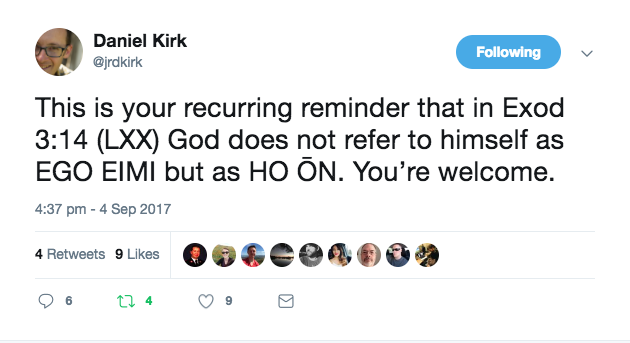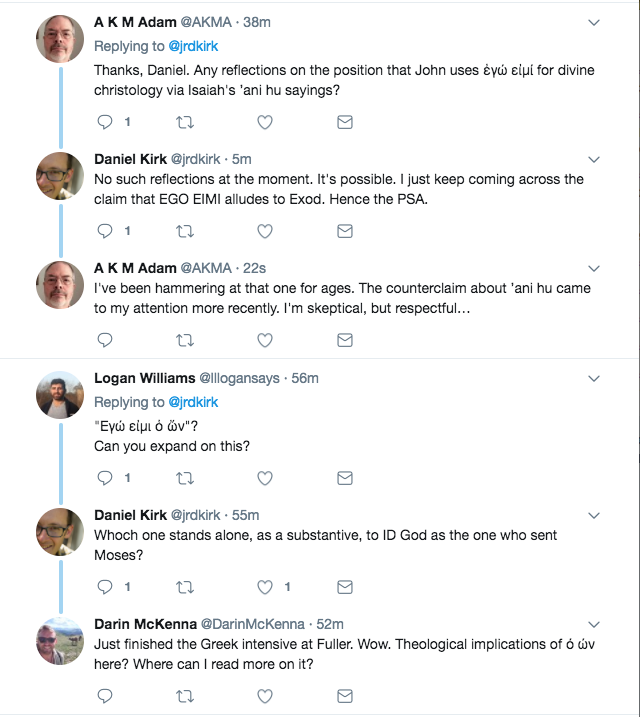New Testament scholar professor Daniel Kirk muses on the translation of Exodus 3:14 in the Greek translation of the Bible as used by Mark. The question has christological implications.



Categories: Bible, Biblical scholarship, Christianity, Islam
New Testament scholar professor Daniel Kirk muses on the translation of Exodus 3:14 in the Greek translation of the Bible as used by Mark. The question has christological implications.



Categories: Bible, Biblical scholarship, Christianity, Islam
“New Testament scholar professor Daniel Kirk muses on the translation of Exodus 3:14 in the Greek translation of the Bible as used by Mark.”
Assumptions, speculation. conjecture. Fairy tales?
LikeLike
“Among the passages distinctive to the Fourth Gospel, none is more striking that the “I am” sayings. Jesus refers to himself using the phrase “I am” only two times in both Mark and Luke (Mark 6:50; 14:62; Luke 22:27; 24:39), and only five times in Matthew (11:29; 14:27; 18:20; 27:43; 28:20). Contrast this with the Gospel of John, where Jesus uses the verb to refer to himself a total of forty-six times!”
you got to admit that is a huge difference.
LikeLike
No. Refuted.
LikeLike
Isn’t this more about the έργο ειμι statements in John than in Mark? I think its use in Mark 14:62 is interesting, but reads very naturally as a simple affirmation (the rest of the verse is where he gets really clear about his identity).
LikeLike
I’m curious to know what Jesus would have supposedly said in Aramaic?
Plus, if the High Priest called blasphemy because of the “I am”, then to what did he object to when the same episode is mentioned in Matthew and Luke without the “I am”? In Luke Jesus says “You say that I am” and in Matthew Jesus says “You have said so” and the reaction from the Sanhedrin is similar.
LikeLiked by 4 people
Excellent point!
LikeLike
But Pilate answered, “You take him and crucify him. As for me, I find no basis for a charge against him.”
7The Jewish leaders insisted, “We have a law, and according to that law he must die, because he claimed to be the son of God.”
/////
33“We are not stoning you for any good work,” they replied, “but for blasphemy, because you, a mere man, claim to be God.”
the high priest blasphemy charge is not to be found in johns version . john is portraying the jews as idiots.
what is this “son of god”
i thought the charge was “claim to be god”
??
john is not saying that they are serious.
he is portraying the religious jews as idiots.
marks version :
Again the high priest asked him, “Are you the Messiah, the Son of the Blessed One?”
62“I am,” said Jesus. “And you will see the Son of Man sitting at the right hand of the Mighty One and coming on the clouds of heaven.”
///
63The high priest tore his clothes. “Why do we need any more witnesses?” he asked. 64“You have heard the blasphemy. What do you think?”
///
quote :
Why then do you accuse me of blasphemy because I said, ‘I am god’s son’?
oh, i forgot, that’s not from mark, that’s from john .
where do you find this blasphemy charge in johns version ?
quote :
20“I have spoken openly to the world,” Jesus replied. “I always taught in synagogues or at the temple, where all the Jews come together. I said nothing in secret. 21Why question me? Ask those who heard me. Surely they know what I said.”
22When Jesus said this, one of the officials nearby slapped him in the face. “Is this the way you answer the high priest?” he demanded.
23“If I said something wrong,” Jesus replied, “testify as to what is wrong. But if I spoke the truth, why did you strike me?” 24Then Annas sent him bound to Caiaphas the high priest.
jesus is not getting in trouble by the jews for blasphemy in johns version .
quote :
Why then do you accuse me of blasphemy because I said, ‘I am god’s son’?
LikeLike